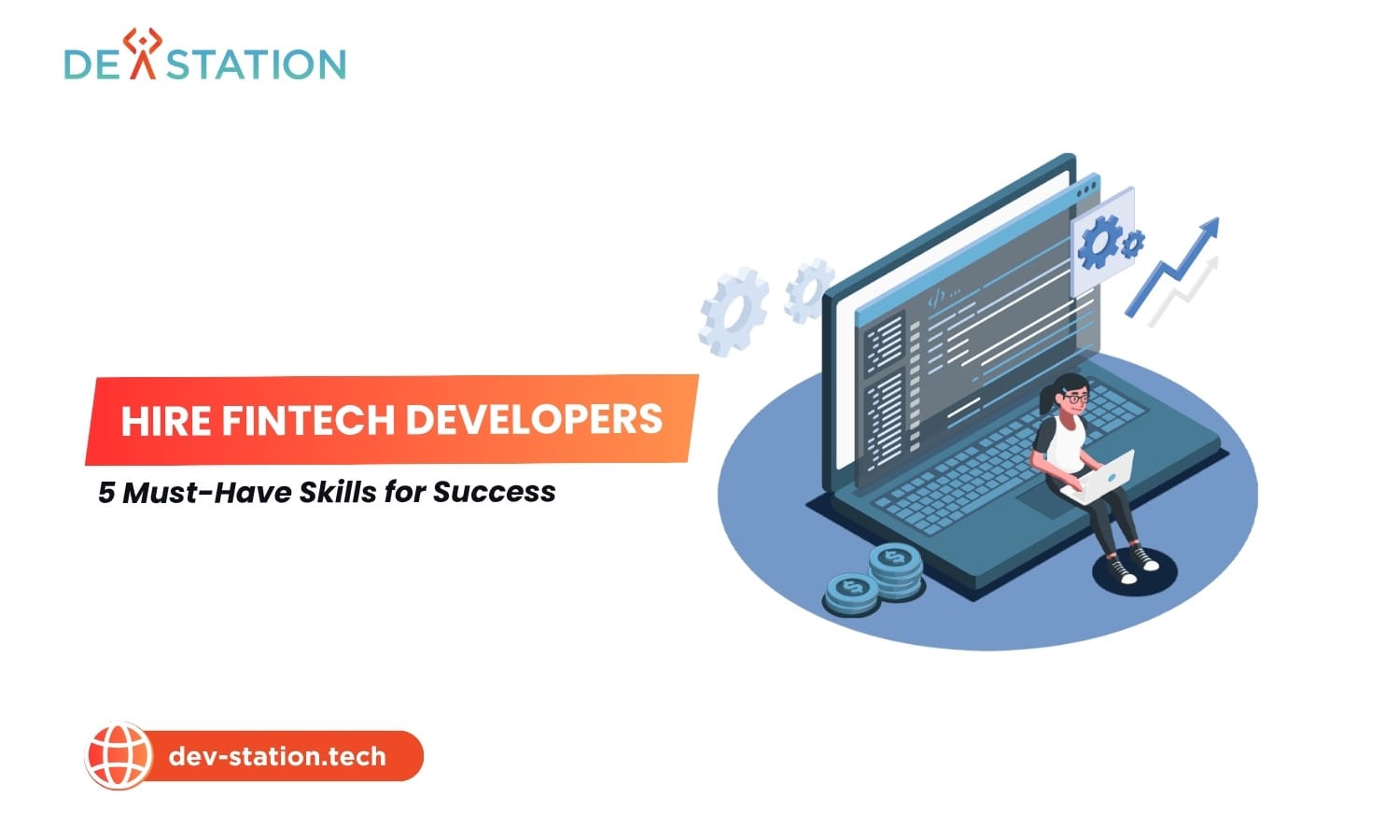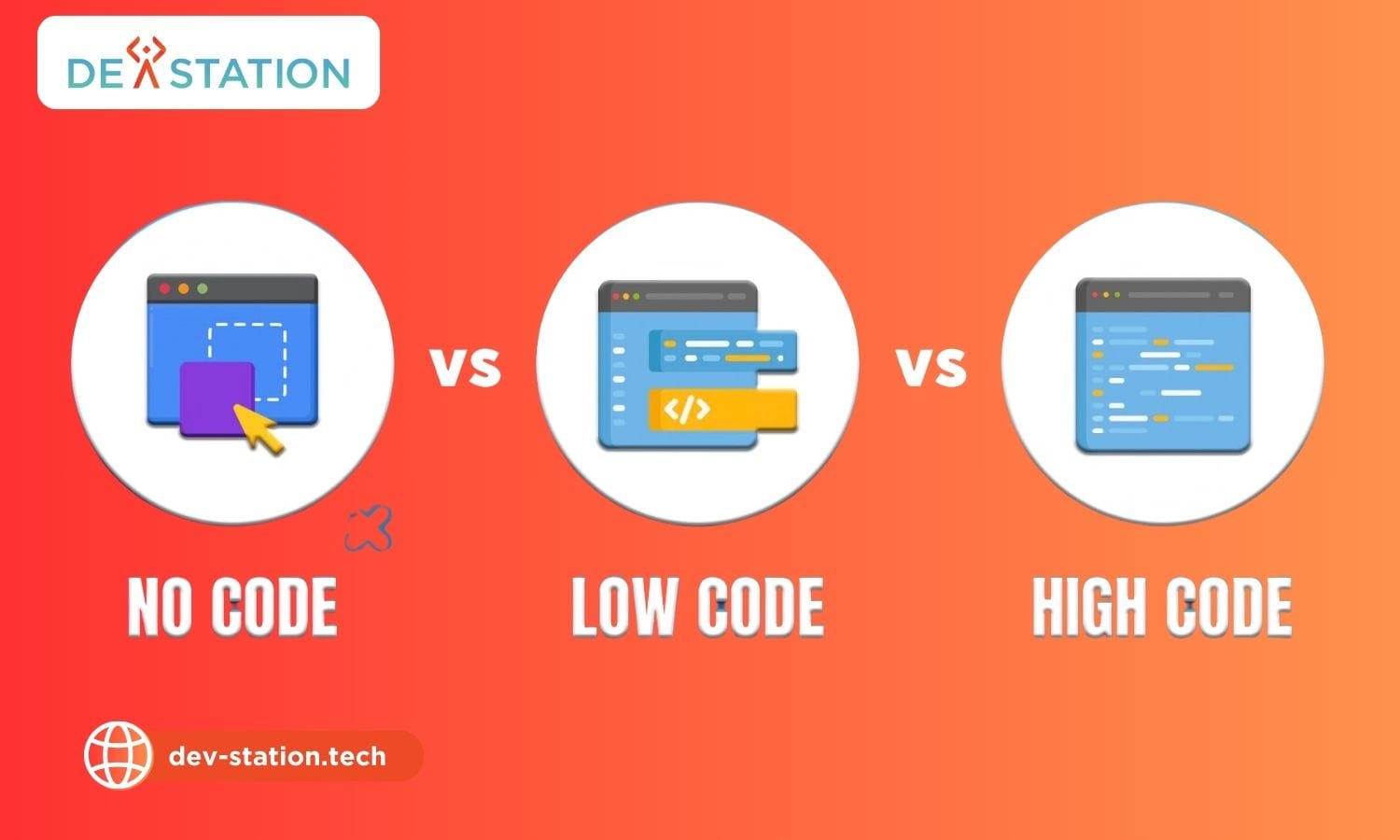Hiring FinTech developers requires a unique blend of financial acumen and technical mastery to navigate this complex sector, a challenge Dev Station Technology at dev-station.tech expertly solves. We provide access to elite engineers possessing these critical skills, ensuring your project’s success from day one and empowering you to build secure, scalable financial technology solutions with confidence. Find financial technology engineers, build a secure application, and achieve scalability.
Contents
ToggleWhat Are the 5 Essential Skills to Look for When You Hire FinTech Developers?
The most critical skills are deep financial domain knowledge, expertise in security and compliance, a strong grasp of data science, proficiency in APIs and integrations, and a solid understanding of scalable software architecture. These five pillars form the foundation of a developer who can build truly transformative financial products.
The global FinTech market is projected to reach an astounding value of over $1.1 trillion by 2032, exhibiting a compound annual growth rate (CAGR) of 16.2% between 2025 and 2032. This explosive growth signals a fierce competition for talent. To build a successful product, you need more than just a good coder; you need a FinTech developer. These professionals are hybrids who blend deep technical expertise with a nuanced understanding of the financial world. At Dev Station Technology, we have identified the five non-negotiable skills that separate a competent developer from a true FinTech innovator. Focusing on these areas will not only streamline your hiring process but also dramatically increase your product’s chances of success in this dynamic industry.
Financial Domain Knowledge a Non-Negotiable Requirement
A developer who cannot distinguish between a derivative and a deposit cannot build effective or compliant financial tools. A lack of domain knowledge leads to flawed logic, poor user experience, and critical requirement gaps that can derail the entire project.
In software engineering, studies consistently show that a deep understanding of the problem domain is a primary predictor of project success. In FinTech, this is amplified. A developer must understand the *why* behind the features they build. For example, when creating a stock trading software development platform, a developer with domain knowledge understands concepts like order types (market, limit, stop-loss), latency, and the critical importance of execution speed. This knowledge directly translates into a better-architected and more reliable product. Without it, they are simply translating instructions, often missing subtle but crucial business logic that a domain expert would catch intuitively. This proficiency becomes the bridge between technical execution and true product-market fit.
Expertise in Security and Regulatory Compliance
It is paramount. A single security breach can destroy customer trust, trigger millions in fines, and end a FinTech startup before it even begins. According to IBM’s 2024 Cost of a Data Breach Report, the average breach in the financial sector now costs $6.08 million.
When you hire FinTech developers, you are not just hiring for features; you are hiring for trust. These developers must be fluent in the language of cybersecurity and compliance. This includes:
- Secure Coding Practices: Understanding and implementing defenses against common vulnerabilities like those listed in the OWASP Top 10.
- Data Encryption: Expertise in encryption standards for data at rest and in transit to protect sensitive customer information.
- Regulatory Frameworks: Familiarity with key regulations such as PCI DSS for card payments, GDPR for data privacy, and AML/KYC protocols for identity verification, which are foundational to banking software development.
A developer who treats security as an afterthought is a liability. A true FinTech professional builds security into the architecture from the very first line of code.
Data Science and Analytics
Modern finance operates on data. Developers need data science skills to build the intelligent, value-added features that differentiate successful FinTech products, such as fraud detection, risk assessment, and personalized financial advice.
The AI in FinTech market is expected to grow from $30 billion in 2025 to over $83 billion by 2030, highlighting the shift towards data-driven services. A FinTech developer should have a foundational understanding of machine learning and data analytics concepts. This allows them to collaborate effectively with data scientists or even implement models themselves. For example, a developer working on a lending platform should understand how predictive models are used for credit scoring. In a wealth management software context, they should understand how algorithms power robo-advisors. Proficiency in languages like Python and familiarity with data science libraries are strong indicators of a developer’s capability in this area.
APIs and Third-Party Integrations
No FinTech application is an island. Its value is derived from its ability to connect seamlessly with the broader financial ecosystem, including payment gateways, data aggregators, and banking cores, which is all done through APIs.
A FinTech developer’s skill in working with APIs is a direct measure of their ability to build a functional and feature-rich product. This involves not only consuming REST or gRPC APIs but also designing and building secure, well-documented, and scalable APIs for your own platform. Experience with platforms like Plaid for account aggregation or Stripe for payments is highly valuable.
This skill also extends to newer technologies; for example, if you plan to enter the decentralized finance space, you need to hire blockchain developers who understand smart contracts and distributed ledgers. Moreover, expertise in legacy systems is often required for enterprise projects. A specialist may be needed if your project involves older payment systems; this is true if you need to hire Moneybookers developer experts who understand the intricacies of platforms like what is Skrill (formerly Moneybookers).
Modern Software Architecture
It is the blueprint for success. A well-designed architecture ensures your application can scale from 100 to 10 million users, remain resilient to failures, and be updated efficiently, which is vital for any serious fintech software development project.
In finance, downtime is not an inconvenience; it is a financial catastrophe. Studies show that for large financial enterprises, a single hour of application downtime can cost upwards of $300,000, with some estimates reaching over $5 million per hour for critical systems. A skilled FinTech developer must be an adept architect. They should be proficient in:
- Cloud-Native Technologies: Experience with platforms like AWS, Azure, or GCP and services that enable scalability and resilience.
- Microservices Architecture: The ability to design systems as a collection of independent, deployable services to improve scalability and maintainability.
- DevOps and CI/CD: A mindset focused on automation, enabling rapid and reliable software releases without compromising stability.
How Do You Build Your Core FinTech Engineering Team?
Building your team is a strategic process that begins with defining your product needs, creating precise role descriptions based on the five core skills, and implementing a rigorous multi-stage interview process to validate both technical and domain expertise.
Assembling the right team for your financial software development project is the most critical investment you will make. Dev Station Technology recommends a structured, four-step approach:
- Define Your Product and Tech Stack: Clearly outline your MVP features. Will you be a payment processor, a lending platform, or an investment app? This dictates whether you need a developer with deep knowledge of payment rails or capital markets.
- Craft Detailed Job Descriptions: Go beyond generic developer roles. For each position, explicitly list the required financial domain knowledge, security standards, and architectural experience you expect.
- Implement a Multi-Stage Interview:
- Screening: A brief call to verify basic domain understanding.
- Technical Challenge: A coding test relevant to a financial problem (e.g., calculating compound interest, modeling a simple transaction ledger).
- System Design Interview: Ask the candidate to architect a small-scale FinTech system, like a payment API. This tests their architectural and security thinking.
- Cultural Fit: Assess their risk awareness and attention to detail, which are vital soft skills in finance.
- Hire Strategically: Your first hire should be a senior, full-stack FinTech developer who can serve as a technical cornerstone. Build the rest of the team around this core expert.
Where Can You Find and Hire Top FinTech Talent?
Top talent is found where finance and technology intersect. This includes niche financial job boards, open-source projects related to finance, and specialized technology partners who maintain a pre-vetted network of FinTech engineering experts.
Finding developers with this rare combination of skills requires a targeted approach. Traditional recruiting channels are often too broad. Here are three effective sources:
| Sourcing Channel | Pros | Cons |
|---|---|---|
| Niche Job Boards | Candidates have self-selected for an interest in finance. | High competition; requires extensive internal vetting. |
| Open-Source Contributions | Allows you to see their code quality and passion for specific areas. | Time-consuming to search; top contributors are rarely looking for work. |
| Specialized Partners | Access to a pre-vetted talent pool; faster hiring process; proven expertise. | Higher initial investment compared to direct hiring. |
For startups and companies that need to move fast without compromising on quality, partnering with a specialist like Dev Station Technology is often the most efficient path. We handle the sourcing and vetting, allowing you to focus on interviewing the best candidates who already meet these stringent criteria.
Build Your FinTech Future with Confidence
Hiring the right developers is the single most important factor in the success of your FinTech venture. The skills outlined above are not just desirable; they are essential for building a secure, scalable, and compliant product that can thrive in a competitive market.
At Dev Station Technology, we specialize in connecting companies with the top tier of FinTech engineering talent. Our rigorous vetting process ensures that every developer we recommend possesses the critical blend of financial knowledge and technical excellence. Do not leave your success to chance. Explore how our experts can help you build your team and your product by visiting us at dev-station.tech or contacting our team directly at sale@dev-station.tech to discuss your project today.





